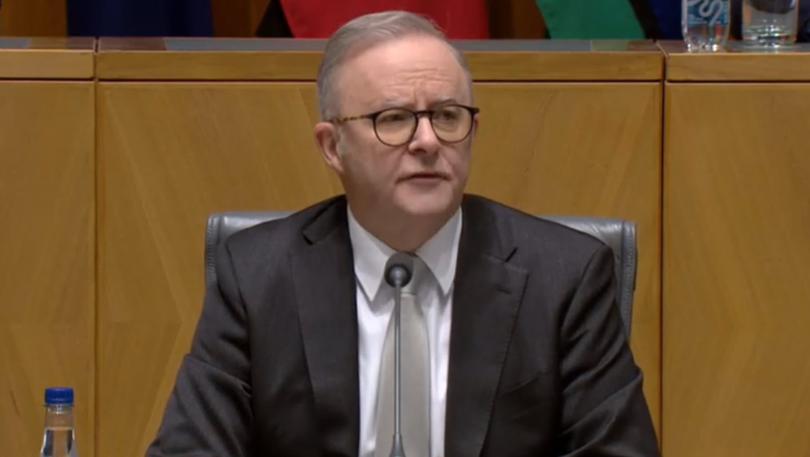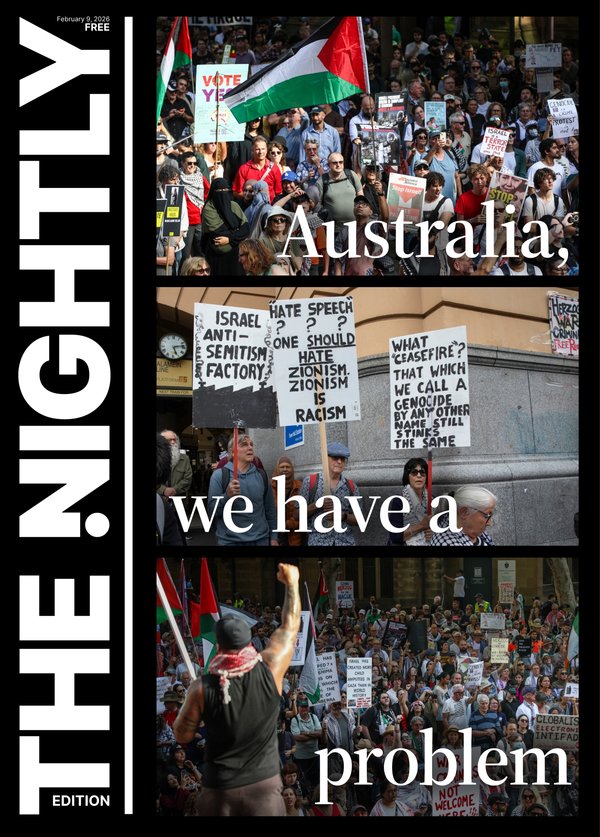National cabinet: PM Anthony Albanese pledges additional $4.7 billion in funding to end gender-based violence
Anthony Albanese has emerged from a national cabinet meeting and committed an additional $4.7 billion in a bid to end the ‘disturbing’ spate of violence against Australian women and children.

Anthony Albanese and State leaders have committed an additional $4.7 billion in a bid to end the ‘disturbing’ spate of violence against Australian women and children.
The Prime Minister convened a meeting of the state and territory leaders in Canberra on Friday to finalise the next steps in the push to end the scourge of domestic violence.
Every jurisdiction will review alcohol laws, there will be national standards for men’s behaviour change programs for the first time, and the Commonwealth will audit its systems to work out if there are areas, such as welfare payments, that are being weaponised by perpetrators.
Sign up to The Nightly's newsletters.
Get the first look at the digital newspaper, curated daily stories and breaking headlines delivered to your inbox.
By continuing you agree to our Terms and Privacy Policy.“These horrific and disturbing deaths and vile violence must be prevented. Achieving this demands action and change at every level of government,” Mr Albanese said.
“But more than that, it also requires action from every part of our society.”
The talks follow an emergency national cabinet meeting in May that was held after a series of high-profile cases of women murdered at the hands of their partners.
Mr Albanese emerged from that meeting with a $925 million package that made the up-to $5000 payment for people fleeing domestic violence permanent.
But there was no immediate new funding for frontline services, prompting a barrage of criticism from advocacy groups, the Greens and independents.
The bulk of Friday’s funding announcement — $3.9 billion — will go towards frontline legal services to give them funding certainty over the next five years and boost salaries to help them recruit more staff.
State and territory governments will decide how to direct the funding, which covers all community legal services including Legal Aid.
However, it includes $500 million prioritised for specialist women’s and family violence prevention legal services.
A separate $700 million funding deal will boost the money on offer to frontline family and domestic services for women and children, and for programs that work with male perpetrators to change their behaviour.
Half this money will come from the Commonwealth and the States will provide the rest, with WA expected to chip in about $35 million.
Both funding agreements start next July.
Deputy Liberal leader Sussan Ley said that was too long to wait.
“Sadly, on the current trajectory of women losing their lives being killed by a man, we would see 40 more women lose their lives before one dollar of this money is spent,” she said.
“If the Prime Minister thought it was important to have a rapid review, he should also have a rapid response.”
There is also still a fight brewing over how the states have spent money already provided to them to boost domestic violence support services, with revelations that of the 352 extra frontline workers supposed to have been hired by July, only 198 have been recruited.
Social Services Minister Amanda Rishworth told the ABC that the States had not met their deadline and the Federal Government expected them to deliver on their commitments.
Queensland Premier Steven Miles said her contribution was “unhelpful”.
Leaders raised concerns on Friday about the red tape wrapped around the Commonwealth funding for workers, which includes requirements that they support specific cohorts including people in regional, multicultural, LGBTQIA+, disability and Indigenous communities.
Some premiers said there would be fewer problems with recruiting workers if there was more flexibility in where they could be allocated.
WA Premier Roger Cook said the details of how and where to allocate the new funding agreed on Friday were still being worked out.
“But as I’ve always said money alone isn’t enough to achieve meaningful change. What we need is cultural change, which involves every Australian,” he said.
“My Government has led the way when it comes to forcing thugs to be electronically monitored via GPS trackers but there is always more we as a nation can do so that is why the outcomes from this National Cabinet are so important.”
Mr Albanese said the overall aim to end violence against women was “not just a matter of government, it is a matter of changing culture”.
Some of the funding would target the “need to change male behaviour” and would also look at misogyny in schools.
Australia was left reeling after a series of high-profile cases in which women were allegedly murdered by their male partners or men who knew them earlier in 2024.
In February, Ballarat mother Samantha Murphy went missing while going for a jog one Sunday morning.
Ms Murphy’s body has still not been found, but 22-year-old Patrick Stephenson has been charged with her murder.
Less than two weeks later, mum-of-five Rebecca Young was strangled by her partner in a suspected murder-suicide.
In April, 23-year-old Hannah McGuire’s body was found in a burnt-out car. Her partner, Lachlan Young, has been charged with her murder.
And in May, WA locals were left reeling after Mark Bombara murdered Jennifer and Gretl Petelczyc before turning the gun on himself and taking his own life.
Jennifer was a friend of Bombara’s ex-wife. Gretl was her daughter. The cowardly murderer had gone to their house hoping to find his ex-wife but turned on her friends when he realised she was not there.
